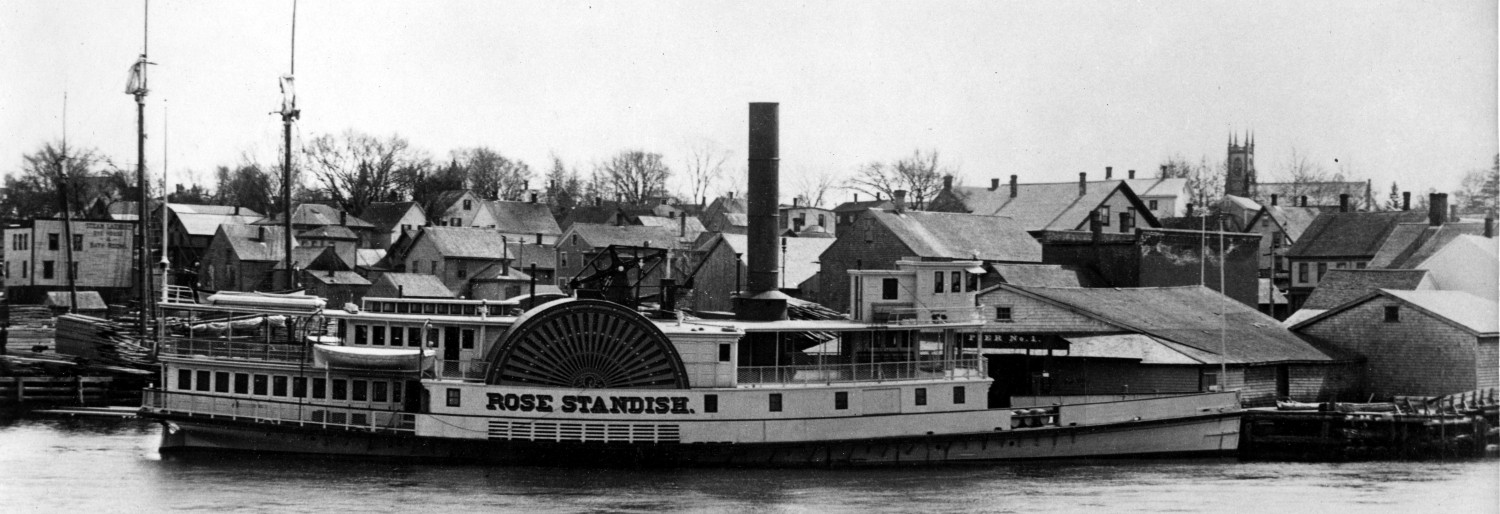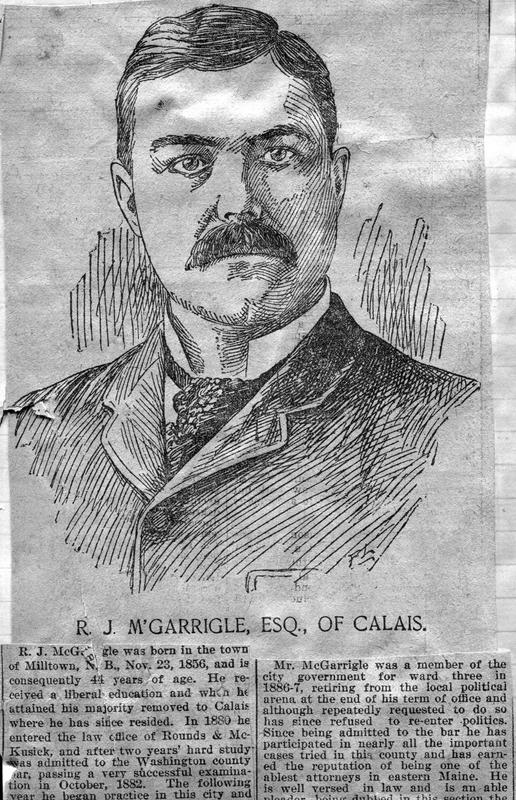
Every defendant in a criminal case expects their attorney to mount a vigorous and energetic defense to whatever criminal charges the State has brought against them. In the early days there few, if any, rules of professional conduct for attorneys, or for that matter judges and law enforcement so chicanery and “sharp practice” was more the rule than the exception in criminal proceedings. One of the best criminal defense attorneys of the late 1800s and early 1900s was Richard J. McGarrigle, shown above and known as R.J. McGarrigle.
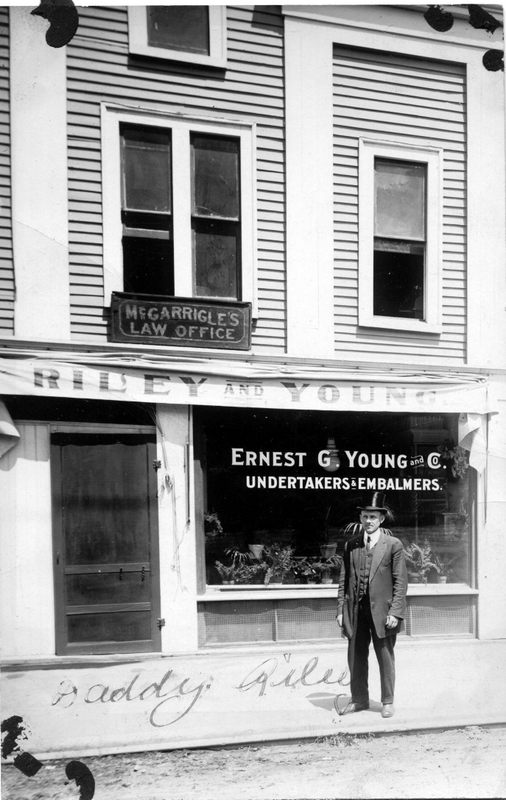
R.J. McGarrigle was born in Milltown N.B. in 1856 and taught school for several years before studying law with Judge Rounds in Calais. McGarrigle was admitted to the Maine Bar in 1882 and soon established a reputation as a fierce advocate for his clients. He practiced law for over 50 years. His office, shown above, was in the Flatiron Block, now the apex of the triangle we now know as Triangle Park on Main Street. Once retained by a defendant R.J. was not adverse to treating the authorities roughly, and not only in the courtroom.
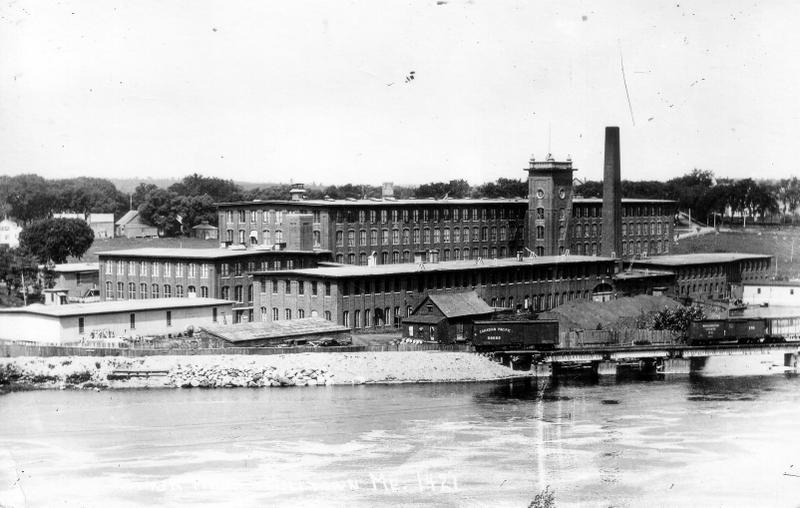
Consider his rather unorthodox defense in 1903 of Frank Lloyd, an agent of cotton mill interests in Lowell Massachusetts. Surprisingly, good mill workers were scarce on the ground in Massachusetts at the time and Frank had come to Calais to hopefully spirit some Canadian cotton mill workers away to Lowell by offering them high wages and good working conditions. This was common practice in those days and it was also in violation of the “Alien Contract Labor Law” which prohibited enticing foreigners into the country with promises of high wages, etc. Frank was caught in the act, so to speak, with two Milltown N.B. girls by Inspector Parker who appears to have been a State of Maine enforcement agent. The situation appeared bleak for Mr. Lloyd, caught red handed and with the two witnesses in Parker’s custody, Parker was probably confident of a conviction. He hadn’t yet reckoned with Lloyd’s attorney, R. J. McGarrigle. The Fitchburg Massachusetts paper tells the rest of the story:
JUNE 25, 1903. Fitchburg Massachusetts Sentinel
AN INTERESTING CONFLICT
WITNESSES SKIPPED TO CANADA and
A LOWELL MAN IS IN THE LOCKUP.
Calais. Me.
Frank Lloyd of Lowell, Mass., is under arrest in this city, charged with violating the alien contract labor law. It is charged that Lloyd has been soliciting help for the Lowell cotton mills from among the employees of the Milltown and St. Stephen, N. B., mills. He has offered many of them, it is told, higher wages than are paid in New Brunswick. Lloyd was arrested by Inspector Parker, who also detained two Mllltown girls as witnesses. The local authorities at first declined to mix up in the affair and Inspector Parker kept his prisoner and witnesses at the St. Croix Exchange, pending the arrival of a United States marshal from Portland. The girls were unwillingly held. R. J. McGarrigle was engaged by Lloyd as counsel and held a conference at the hotel with Parker, the two girls being present. It is said that during the” interview” McGarrigle grappled with Parker and forcibly held him while the girls fled from the room. The girls started for the Canadian boundary line pursued by Parker, who in turn was followed by McGarrigle. Just before the boundary line was reached McGarrigle again interfered and gave the girls an opportunity to get safely across. Lloyd was taken from the hotel after this affair and confined in the city lock up. The evidence against Lloyd consists mainly of the testimony of the two girls, and it is not known what action will now be taken by the United States marshal when he arrives to assume charge of the matter.
Mr. Lloyd was almost certainly a free man before nightfall thanks to Atty McGarrigle who even in the freewheeling spirit of the times probably exceeded the bounds of his duties to his client and in the process violated his obligations as an attorney to act lawfully. Still there are other reported cases which indicate he would do whatever was required to win a case. Just a year earlier he was defending a man charged with assault on his step-daughter. The trial began on Friday and may not have been going well for the defense. Adjourned until Saturday morning for final testimony the prosecutor was surprised to find neither the victim nor her mother in the courtroom on Saturday morning -both had taken the early train to Machias. One wonders who paid for the tickets. The Court was forced to dismiss the charges.
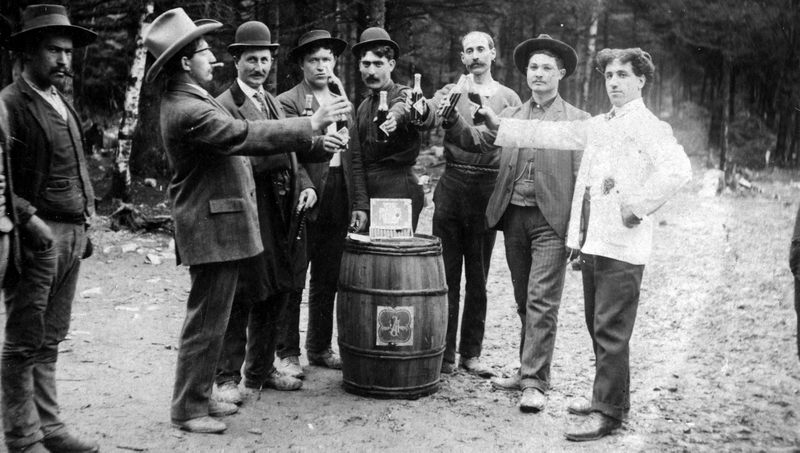
This is not to say McGarrigle was a scoundrel, such tactics were common at the time. The prosecutor “found” surprise witnesses when things were going badly in the State’s case as often as the defense managed to “disappear” those of the State. In fact R.J. McGarrigle was often on the right side of justice, defending the down and out and oppressed and there were none quite so abused at the time as the Italian contract laborers building the Woodland paper mill. Unscrupulous contractors such as Charlie Murray, an Italian who had Americanized his name, often brought men from New York and Boston to this area to work on the mill, on the railroad and to build the utility systems of the local towns. When promised wages and working conditions proved fictions men who decided to return home were detained by various legal stratagems, although not always successfully:
Bangor Daily News June 12, 1905
14 Italian laborers from Sprague’s Falls, who were arrested in Calais Wednesday were taken to Baileyville Thursday morning and given a hearing before Trial Justice Larabee. They were charged with the larceny of $10 from Chas. Murray, the Italian contractor. They pleaded not guilty. R. J. McGarrigle appeared as counsel for the Italians. Not enough evidence was found to convict them and they were discharged by Trial Justice Larabee but they were rearrested on a warrant charging them with the theft of 13 mattresses from the building of the St. Croix Paper Co. They pleaded not guilty and no evidence was presented they were discharged by the Trial Justice. In the course of the proceedings the Italians claimed that they were hired by an agent of Murray’s in New York and they claimed that they were to receive for their day’s work $1.75 to $2.00 and after they arrived at the Falls they found they were only getting $1.50 per day and the price of groceries. etc., very-high and they decamped. But were detained in the above manner. After being discharged they walked back to Calais and left by boat for Boston Friday morning.
Richard J. McGarrigle died in Calais at 84 years of age in 1941. In addition to his success as an attorney he had a remarkable singing voice and was much in demand at local musical events. He was prominent in local politics and the Knights of Columbus.
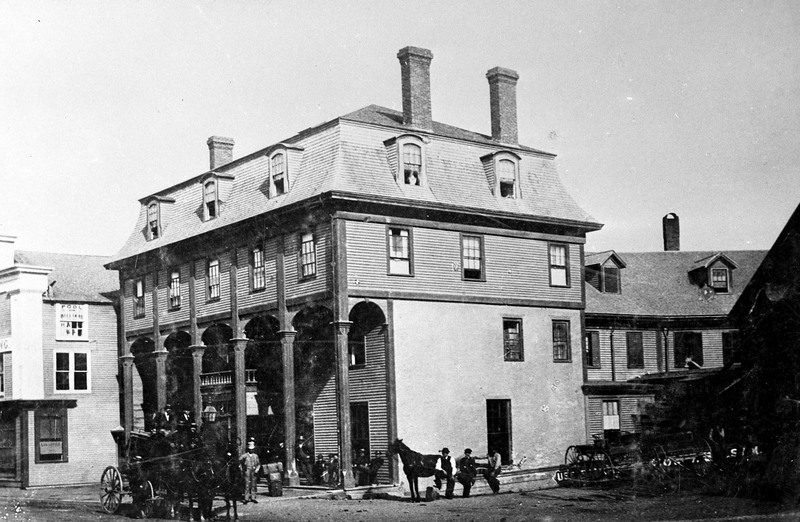
St Croix Exchange in very early photo circa 1875-80, later the St. Croix Hotel
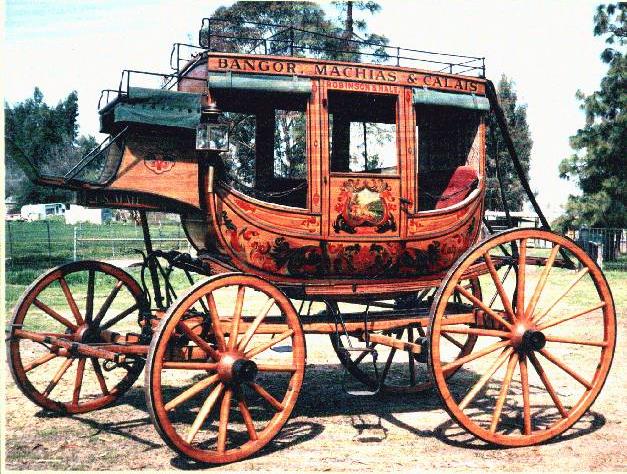
This early Concord coach from the Calais-Bangor route is in a museum out west
The incident at the St. Croix Exchange related above inspired us to reflect on this venerable institution. Built in the 1830s as the Frontier and demolished in 1983 it was for a century and a half a gathering place for locals and visitors to Calais. Once four stories as seen in the photo above, it contained over 40 rooms and was certainly the busiest hotel in Calais, being the stagecoach stop in the early years and later the only hotel within walking distance of the railroad station. In its old age five Greyhound buses a day stopped at the St. Croix Hotel, its name was changed when it was rebuilt after a fire in 1900 destroyed its top floor. Even at half occupancy and it was often filled in its heyday, we estimate well over over two million guests stayed at the St Croix over its lifetime. Millions dined in its restaurant and gathered in the meeting rooms not to mention the assignations made, broken and discovered, marriage proposals rejected and accepted, business deals large and small consummated, deaths and births recorded. James Shepperd Pike, Calais’ most illustrious son, protégé of Horace Greeley and Abraham Lincoln’s ambassador to the Hague during the Civil War, died at the St. Croix Exchange waiting for the stage, perhaps the one in the photo above, to take him from his summer home in Robbinston to his winter residence in Philadelphia. The hotel was also a place where a thirsty traveler or local could get a drink during the many decades of prohibition in Maine which may have been why it was raided on a regular basis although usually with prior warning from the Calais police. Occasionally liquor was found and a small fine paid but this represented nothing more than a cost of doing business.
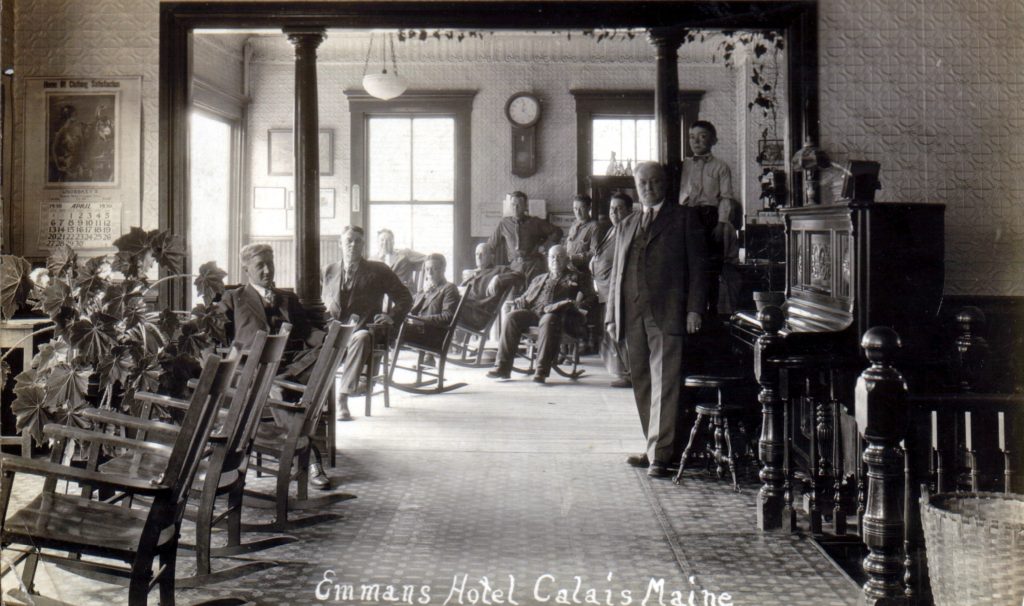
In the St. Croix’s lobby and lounge of which we sadly have no photograph, Calais’ wise men and fools no doubt hotly debated the relative merits of Lincoln and Douglas, the Roosevelts- Calais being a conservative stronghold they would have loved Teddy but likely would have been appalled at Franklin’s New Deal- and other politicians, mourned the assassinations of Lincoln, Garfield, McKinley and Kennedy and shed tears over the casualty lists from the Civil War when such names as Holmes, Haycock and Furlong appeared along with many other local boys. They would have argued vehemently both sides of the issue of the abolition of slavery and the wisdom of going to war to save the Union although on this issue Calais was staunchly pro-union. Both World Wars would have seen daily deliberations over the heavily censored news from the front-what was true and what was merely wishful thinking. R.J. would have been particularly interested in these discussions as his son, R.J. Jr was fighting with the 103rd Infantry in France, a unit which was to distinguish itself in some decisive battles at the end of the war. Even on quite news days the lounge and lobby almost certainly generated enough gossip and rumor to keep Calais abuzz. The St. Croix was at the center of town in more ways than one and R. J. McGarrigle had an office just a few feet away. The stories he could tell.
